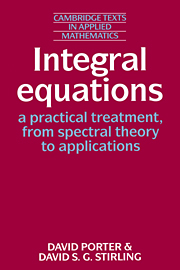Book contents
- Frontmatter
- Contents
- Preface
- 1 Classification and examples of integral equations
- 2 Second order ordinary differential equations and integral equations
- 3 Integral equations of the second kind
- 4 Compact operators
- 5 The spectrum of a compact self-adjoint operator
- 6 Positive operators
- 7 Approximation methods for eigenvalues and eigenvectors of self-adjoint operators
- 8 Approximation methods for inhomogeneous integral equations
- 9 Some singular integral equations
- Appendix A Functional analysis
- Appendix B Measure theory and integration
- Appendix C Miscellaneous results
- Notation Index
- Index
5 - The spectrum of a compact self-adjoint operator
Published online by Cambridge University Press: 05 June 2012
- Frontmatter
- Contents
- Preface
- 1 Classification and examples of integral equations
- 2 Second order ordinary differential equations and integral equations
- 3 Integral equations of the second kind
- 4 Compact operators
- 5 The spectrum of a compact self-adjoint operator
- 6 Positive operators
- 7 Approximation methods for eigenvalues and eigenvectors of self-adjoint operators
- 8 Approximation methods for inhomogeneous integral equations
- 9 Some singular integral equations
- Appendix A Functional analysis
- Appendix B Measure theory and integration
- Appendix C Miscellaneous results
- Notation Index
- Index
Summary
Introduction
Chapter 4 was devoted to the spectral theorem in which we characterised a compact self-adjoint operator in terms of its eigenvalues and eigenvectors, and from this we were able to deduce substantial qualitative results about integral equations. Far reaching though these may be, they have the drawback that they involve the eigenvalues and eigenvectors of the particular integral operator being investigated. In many cases the exact determination of eigenvalues and eigenvectors will itself be a difficult problem, so in this chapter we shall derive a body of results giving characterisations of the various eigenvalues of a particular operator, and relations between the eigenvalues of the sum and product of two operators and those of the summand operators. The techniques used here yield some results immediately on the approximation of one operator by another, and these can be used to estimate the eigenvalues of otherwise recalcitrant operators. The main emphasis of this chapter, however, is not on approximation techniques, which will be dealt with in Chapters 7 and 8, but on suitable characterisations of the quantities involved which will form the foundations of these approximation techniques.
The Rayleigh quotient
If H is a Hilbert space and T a bounded linear map from H to itself, then associated with each vector φ ∈ H there is a scalar quantity (T φ, φ), which is real if T is self-adjoint, for then (Tφ, φ) = (φ, T*φ) = (φ, Tφ) = (Tφ, φ).
- Type
- Chapter
- Information
- Publisher: Cambridge University PressPrint publication year: 1990



